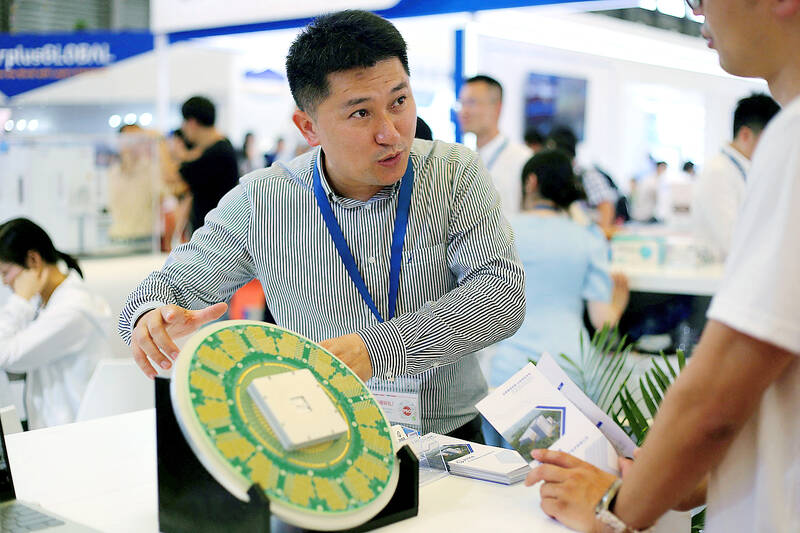Geopolitics and the national security concerns of some countries are threatening the globalization of the world’s chip industry and its future growth, the chairman and acting CEO of memorychip maker Yangtze Memory Technologies Co (YMTC, 長江存儲) said on Thursday.
Chen Nanxiang (陳南翔) said in a speech at the opening ceremony of the Semicon China conference in Shanghai that this made him doubt whether the global semiconductor industry could realize an earlier forecast of US$1 trillion in sales by 2030.
“There is a lot of government intervention, and a lot of political content is added in the middle,” he said, adding that he fully agreed with the comments Taiwan Semiconductor Manufacturing Co (台積電) founder Morris Chang (張忠謀) made in March about how globalization in the chip sector was “dead.” He did not name any countries.

Photo: Reuters/Nicoco Chan
“Our industry itself is cyclical, and each practitioner has his own way of dealing with the cycle. However, the high degree of uncertainty we face is precisely due to the destruction of globalization,” he said, adding that he felt that the global industry was entering a “period of turmoil.”
Modern chipmaking involves more than 1,000 steps and requires complex intellectual property, tools and chemicals from around the world.
China, one of the largest chip markets, has been trying to build up its own manufacturing capability.
However, in recent years it has come under pressure from the US, which is keen to undercut these efforts.
YMTC is among key Chinese firms caught in the crossfire, after Washington enacted export controls last year against it and more than a dozen other players in the Chinese artificial intelligence chip sector on a trade blacklist over fears it could divert US technology to previously blacklisted Chinese tech giants Huawei Technologies Co (華為) and Hikvision Digital Technology Co (海康威視).
The move barred YMTC’s suppliers from shipping US goods to it without a difficult-to-obtain license.
Chen hinted at YMTC’s own troubles during his speech, with a direct appeal to equipment suppliers in attendance.
“For YMTC that I manage, we can no longer procure parts and components for equipment we had legally bought. If it is fair, please set up some fair rules to buy back the equipment,” he said.

TRADE WAR: Tariffs should also apply to any goods that pass through the new Beijing-funded port in Chancay, Peru, an adviser to US president-elect Donald Trump said A veteran adviser to US president-elect Donald Trump is proposing that the 60 percent tariffs that Trump vowed to impose on Chinese goods also apply to goods from any country that pass through a new port that Beijing has built in Peru. The duties should apply to goods from China or countries in South America that pass through the new deep-water port Chancay, a town 60km north of Lima, said Mauricio Claver-Carone, an adviser to the Trump transition team who served as senior director for the western hemisphere on the White House National Security Council in his first administration. “Any product going

High above the sparkling surface of the Athens coastline, the cranes for building the 50-floor luxury tower centerpiece of Greece’s future “smart city” look out over the Saronic Gulf. At their feet, construction machinery stirs up dust. Its backers say the 8 billion euro (US$8.43 billion) project financed by private funds is a symbol of Greece’s renaissance after the years of financial stagnation that saw investors flee the country. However, critics see it more as a future “ghetto for the rich.” It is hard to imagine that 10km from the Acropolis, a new city “three times the size of Monaco”

STRUGGLING BUSINESS: South Korea’s biggest company and semiconductor manufacturer’s buyback fuels concerns that it could be missing out on the AI boom Samsung Electronics Co plans to buy back about 10 trillion won (US$7.2 billion) of its own stock over the next year, putting in motion one of the larger shareholder return programs in its history. South Korea’s biggest company would repurchase the stock in stages over the coming 12 months, it said in a regulatory filing on Friday. As a first step, it would buy back about 3 trillion won of paper starting today up until February next year, all of which it would cancel. The board would deliberate on how best to effect the remaining 7 trillion won of buybacks. The move

In a red box factory that stands out among the drab hills of the West Bank, Chat Cola’s employees race to quench Palestinians’ thirst for local products since the Gaza war erupted last year. With packaging reminiscent of Coca-Cola’s iconic red and white aluminum cans, Chat Cola has tapped into Palestinians’ desire to shun brands perceived as too supportive of Israel. “The demand for [Chat Cola] increased since the war began because of the boycott,” owner Fahed Arar said at the factory in the occupied West Bank town of Salfit. Julien, a restaurateur in the city of Ramallah further south,